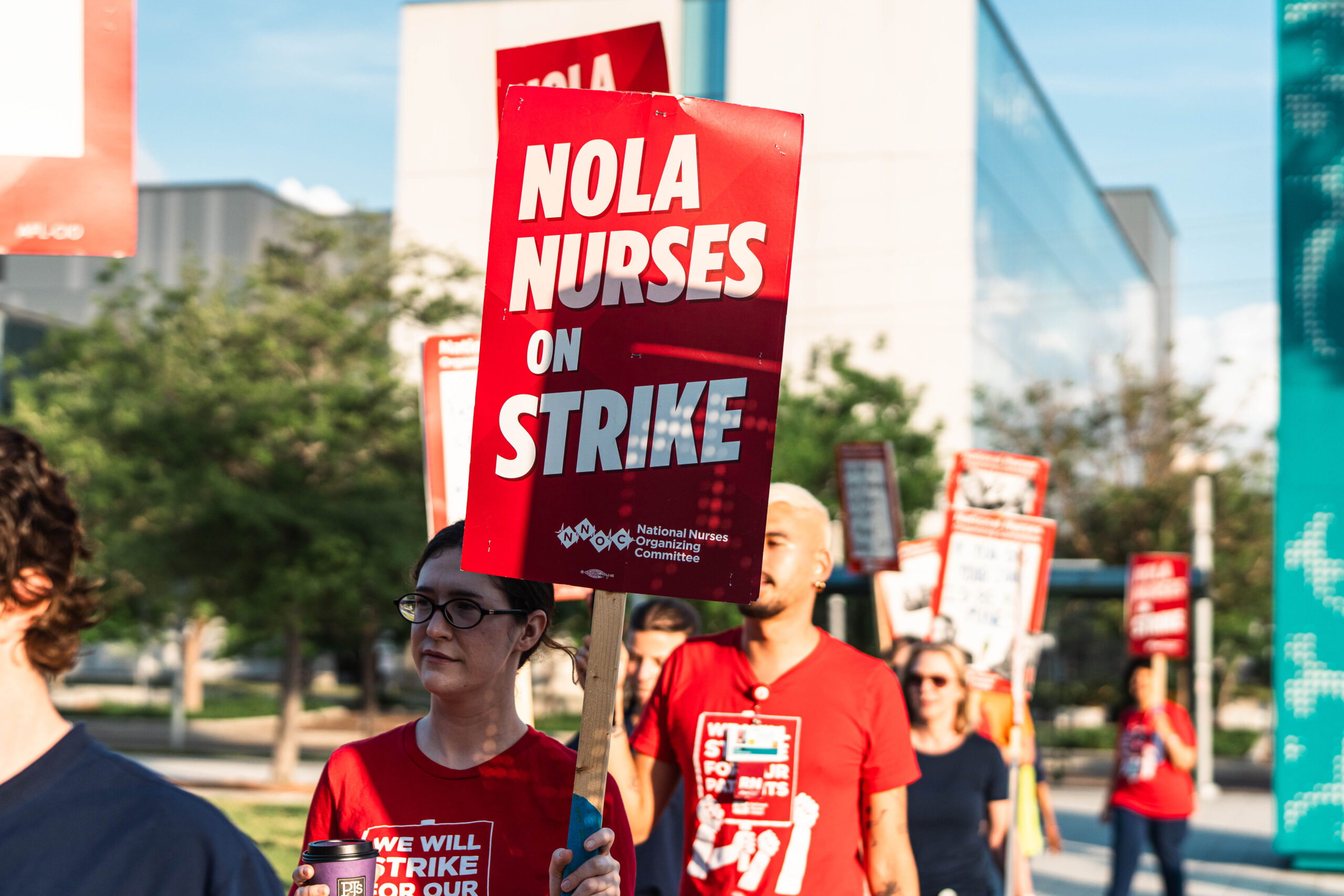
With Kendrick Lamar’s “Not Like Us” as a soundtrack, nurses at New Orleans’ University Medical Center walked off the job for the third time, picketing along the city’s Canal Street thoroughfare earlier this month.
“We will picket, shout, bargain, petition and strike again, and again, and again until the nurses win the first contract!” Terry Mogilles, an orthopedic trauma clinic nurse, told a rapt crowd on May 1. The crowd comprised about 100 nurses and their supporters, with many of the nurses wearing scrubs or red shirts with white lettering reading “We Will Strike for Our Patients!”
Mogilles and roughly 600 University Medical Center nurses voted to unionize with National Nurses United in December 2023. They are in their 16th month of union representation but say their employer is stalling on a contract that would actually improve their jobs. (Disclosure: National Nurses United is a funder of Capital & Main.)
Observers say nurses may be waiting even longer. On average, health care unions go around 17 months before obtaining first contracts. Today, the nurses not only have to overcome their employer’s resistance, but the downstream effects of the Trump administration’s policy changes, too.
In November, University Medical Center Management Corporation, filed a complaint with the National Labor Relations Board, blaming the union for delays in negotiations. Workers say it is UMC that is delaying, and LCMC, the parent corporation for UMC and one of only two hospital administrators in the city, declined Capital & Main’s request for comment.
Nurses at University Medical Center are running up against a systemic flaw facing most newly organized workers — made worse by the current presidential administration, said Margaret Poydock, senior policy analyst at the Economic Policy Institute.
While the National Labor Relations Act mandates that employers must “bargain in good faith,” the law does not enforce a timeline on negotiations; more than half of all newly organized unions take over a year to get a contract, and the average as of 2022 was 465 days. There’s also a built-in incentive for anti-union employers to delay first contracts: One year after workers win union recognition, they can vote to dissolve their union. A long delay can enable employers to restart union-busting efforts.
“There are not really legal penalties,” said Poydock, because the National Labor Relations Board cannot fine employers for prolonging negotiations. Furthermore, said Poydock, in the case of unions who believe that their employer is not bargaining in good faith, “The only legal recourse workers have is through the board.”
However, the Trump administration has thrown the National Labor Relations Board into turmoil. One week after his inauguration, Trump fired the Joe Biden-appointed NLRB chair, Gwynne Wilcox, leaving the five-member board with just two members. The agency cannot issue decisions without a quorum of three members, giving reluctant employers even less incentive to bargain in good faith, knowing cases brought against them can be prolonged. While Wilcox has sued for reinstatement, the case has bounced between judges and is still in litigation. If Wilcox loses her case, the board may remain without a quorum; if Wilcox wins reinstatement, Trump can appoint two more members to the board, creating a conservative majority. “That might make workers more hesitant to bring cases to the board, because they potentially will not have a ruling that favors them,” said Poydock.
President Trump also signed an executive order gutting the Federal Mediation & Conciliation Service (FMCS), cutting its staff from 220 to about a dozen and “eliminating [the FMCS and six other agencies] to the minimum presence and function required by law.” The service helped workers and companies reach contract agreements. Though National Nurses United did not comment on whether it planned to seek FMCS involvement, without protections from the National Labor Relations Board or support from FMCS, unions like the one at University Medical Center have fewer options — outside of strikes — to force their employers to negotiate with them.
New Orleans nurses say they walked out because workplace conditions have failed to improve.
The union has struck twice before, in October 2024 and February. Both times, management locked them out, costing LCMC a reported $2 million per day, or a total of $16 million.
In the months since, nurses say workplace violence has continued, pay is not sufficient, and University Medical Center has moved too slowly on contract negotiations.
“We had a number of nurses that were hurt on the job by patients; the potential for danger went up instead of going down,” said Mogilles. Nurses also say there have been several instances in which guns have been found in the hospital, and that chronic understaffing has continued, endangering patients and nurses alike.
Negotiations over pay have also contributed to the strike. Nurses say University Medical Center officials took eight months to respond to a seven-page wage proposal nurses had submitted last July. The hospital response, they say, was one paragraph long.
Umer Mukhtar, an ICU nurse and bargaining team member, said that the hospital’s delayed response “was a very strong motivation for us to come out and picket again.”
Mukhtar said retention at the hospital is poor, noting that eight nurses left his ICU in the past month.
“They [LCMC Health] want to keep [telling] lies while they buy time to union-bust and hopefully — for them — decertify the union,” he said. “They’re trying to make [the majority of nurses think that] the union is not an effective bargaining tool.”
On Canal Street’s rain-washed stage, Mogilles earned riotous applause as she closed out her speech. “Asking politely does not work!,” she said. “LCMC, you not like us! And we’re so glad we not like you.”







